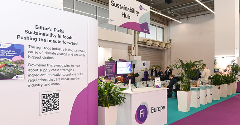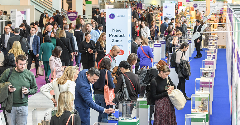News
Creating Value through Sustainable Packaging
16 Sep 2014Sustainability has become a key corporate goal, particularly for the fast-moving consumer goods industry with widespread implications for packaging. For example there is increasing demand for greater energy efficiency in packaging and for products and packaging which can reduce product losses within the complex logistics chains – which eventually finish with the consumer. Broadly there […]

Sustainability has become a key corporate goal, particularly for the fast-moving consumer goods industry with widespread implications for packaging. For example there is increasing demand for greater energy efficiency in packaging and for products and packaging which can reduce product losses within the complex logistics chains – which eventually finish with the consumer. Broadly there is also an emergent perspective of ‘truly ecological’ packaging/product systems, rooted in the concept of a circular economy – with the ambition to achieve zero waste, triggering wider more integrated and innovative stakeholder interactions.
A variety of strategies exist to meet the “demand driven” need for eco-innovative packaging and these converge with industry’s current accentuated need for economic efficiency – mirroring two sides of the same sustainability issue. The resultant challenge leads to a highly complex eco-innovation domain, requiring input from a broad range of key influencers which includes brands, consumer groups, technologies and NGOs. The packaging sector is of particular interest within this context because these networks are interwoven in the wide range of functional and emotional brand requirements linked to sustainable packaging. Critically, packaging is also the key touch point between a brand and its perceived credentials and commitment to sustainability.
It is important, therefore, that companies wishing to be successful in delivering eco-innovative solutions understand both (i) the context of eco-innovation in respect of the variety of different influencers and (ii) how to innovate and achieve successful outcomes within this domain.
Conceptual models will be presented at our Fi Global Summit 2014 workshop which will allow us to consider the relationship between networks of influencers and the goal of eco-innovation in a context which mirrors current trends in FMCG packaging. This approach will also facilitate the exploration of eco-innovation in unique scenarios – where new levels of connectivity between influencers in the future may lead to different and more desirable outcomes for brands, consumers and the environment. As a precursor we site a number of connections which highlight this rich multi-perspective view and which is a valuable springboard for eco-innovation:
The technology connection
From a technological perspective we increasingly see how successful organisations deploy a wide range of tools and techniques to facilitate network connection and understanding – not least the use of external individual, agents and organisations to mine and filter new technology and initiate new directions for product propositions. The domain of smart and active packaging systems is such an area; where for example, ethylene absorber technology is now mature and being exploited to extend the shelf life of fresh strawberries and avocados. Innovative barrier layers using aluminium nanoparticles applied directly to plastic film replacing the need for foil laminates; and intelligent packaging solutions such as temperature time indicators (TTIs) used in labels to indicate product freshness are also part of this technical and sustainable opportunity space.
Sector competitiveness is also driving a growing interest in new sources of IP such as universities and distributed ‘open-innovation’ practices – which are in turn bringing additional challenges to successful technology development.
The consumer connection
In terms of the consumer, the increase in virtual web serviced businesses is forcing companies to rely more on packaging as the key first experience of a brands product offering. Companies such as Amazon who appreciate this dynamic have increased their connectivity to the consumer in an effort to forge stronger links and relationships with their brand – in Amazon’s case by facilitating consumer feedback in relation to their packaging via their website.
There are many ways packaging may add value to brands through better emotional engagement with consumers whilst delivering environmental sustainability. For example, Sweden based Innventia’s ingenious origami style carton for noodles reveals a small hole in the bowl following removal of a retaining strip by the user. This allows hot water to be poured in which causes the compact carton to expand into a generous meal. Thus, the 100% compostable paper-based carton serves up convenience combined with eco-friendliness, in a way which is novel and highly direct in its engagement of the user.
The brand connection
The pressure for brands to balance cost competitiveness against environment and public perception is still extremely challenging. However, some companies have found highly distinct and novel ways to achieve this. For example, Daylesford Organic Farm has adopted the innovative and highly resource efficient Ecolean pouch with ergonomic air sac handle for its milk. The flexible multi-layered film consists of 60% polyethylene and polypropylene, and 40% calcium carbonate. This has enabled a significant saving in their packaging’s carbon footprint compared to a standard HDPE bottle – while providing a highly differentiated brand/packaging experience in their sector.
For many brands the perceptual issueswhich surround new packaging formats and more sustainable solutions need to be carefully considered – especially since consumers are increasingly questioning corporate practice generally in the face of issues such as environment, health and food safety.
In summary, understanding relationships of key stakeholders in the eco-innovation network, not least the end-user and numerous separate ‘solution-providers’, are central to brands achieving innovative and effective outcomes which ultimately deliver real business value.
Related news

Paris Olympics: Food and beverage brands champion health, fun, and sustainability
5 Aug 2024
Food and beverage brands are aligning with the Paris Olympics 2024 Food Vision, which emphasises sustainability, local sourcing, and plant-based diets.
Read more
Natural Remedies: Bringing health and happiness via validated branded ingredients
18 Apr 2024
Natural Remedies is an internationally renowned botanical healthcare company committed to advancing the field through rigorous research and the development of clinically validated Branded Ingredients. Guided by our foundational principle of ‘BEING USEF...
Read more
Exploring the future of health and wellness retail at Vitafoods Europe
14 Mar 2024
With retail-focussed content sessions, buyer networking, and finished product tasting sessions, this year’s Vitafoods Europe offers a not-to-be-missed opportunity for retailers to up their health and wellness game.
Read more
Sustainability meets innovation at Fi Europe 2023's Sustainability Ingredients Zone
9 Jan 2024
Fi Europe’s Sustainable Ingredients Zone showcases ingredients forging a path toward a greener future. Three innovators are redefining what sustainability within the food and beverage industry means, with upcycled products, regenerative agriculture, an...
Read more
Unleashing the power of plants at Fi Europe’s New Product Zone
5 Jan 2024
In the diverse landscape of plant-based innovation, Fi Europe 2023's New Product Zone spotlighted ten plant-based ingredients, tailored to meet the rising demand for sustainable and delicious options.
Read more
Meet the innovative ingredients showcased at Fi Europe’s New Product Zone
3 Jan 2024
The Food Ingredients category at Fi Europe’s New Product Zone featured 19 distinct and innovative products. From fermented delights to sustainable proteins, these ingredients are ready to make their mark in the market.
Read more
Fi Europe’s New Product Zone elevates the nutrition of everyday indulgences
22 Dec 2023
At Fi Europe 2023's New Product Zone, eight health ingredients, each offering an enhanced nutritional profile of various products, were on display. These ingredients address the evolving needs of the food and beverage industry and cater to consumers se...
Read more
Fi Europe’s New Product Zone explores fresh possibilities with five natural ingredients
20 Dec 2023
Fi Europe 2023's New Product Zone unveils five natural ingredients, each catering to the growing demand for clean products and embodying ethical and sustainable choices for today's conscious consumers.
Read more
Water-conscious consumers, upcycled food, and tech-driven sustainability: Highlights from Fi Europe, part 2
14 Dec 2023
With climate change becoming a tangible reality, consumers’ environmental concerns are changing. At Fi Europe, market analysts revealed how people are now interested in everyday issues like water shortages and tech-driven solutions such as GM drought-r...
Read more
The food industry’s single-use packaging problem
12 Dec 2023
The food industry’s reliance on single-use packaging is a sustainability “sticking point” with viable alternatives not widely available – but new EU rules mean food businesses will remain responsible for the collection and disposal of the packaging the...
Read more